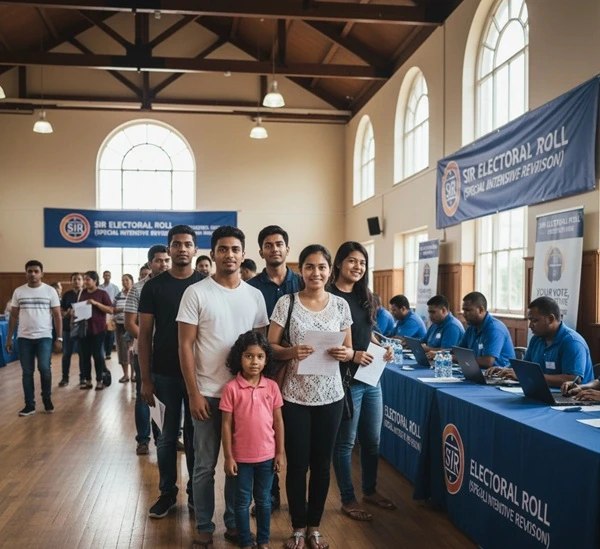The democratic foundation of India rests on the principle that every citizen who is eligible to vote should be able to do so—and that, conversely, only eligible citizens are listed on the voter roll. To uphold this, the Election Commission of India (ECI) from time to time undertakes comprehensive exercises to update, clean and verify the electoral roll. One such exercise is the Special Intensive Revision (SIR) of the electoral roll.
In this blog we will walk you through what SIR is, why it’s being done, how it affects you and what you should do to be ready.

1. What is the Electoral Roll?
An electoral roll (also called a voter list or electoral register) is basically a list of all persons who are eligible and registered to vote in a particular constituency. In India, the electoral roll is prepared under the legal framework of the Representation of People Act, 1950 and the rules thereunder.
Eligibility normally means:
- You are a citizen of India.
- You have attained the age of 18 years (or will by the qualifying date).
- You are ordinarily resident in the constituency for which you are seeking registration.
The roll is vital because during elections, polling officials refer to this list to allow or deny someone the right to vote. If your name is missing even though you are eligible, you lose your vote for that election, if someone ineligible is on the list, it undermines fairness.
2. What is the SIR (Special Intensive Revision) of the Electoral Roll?
“SIR” stands for Special Intensive Revision. It is not the ordinary, routine updating of the roll (which happens via summary revision or periodic updates) but a full-blown exercise by the ECI to re-verify, house-to-house and rebuild the voter list from a near-scratch basis in a given constituency or state.
Key features of SIR include:
- A qualifying date is fixed (for example 1 July 2025 in one state).
- Booth-Level Officers (BLOs) or other field staff carry out door-to-door enumeration (visiting houses) to collect updated forms and verify residence, identity, age, etc.
- All eligible persons are invited to apply and the lists of names of persons who would be deleted (for example because of death, shifting, duplicate entries, migration) are published.
- The goal is to make the electoral roll accurate, inclusive and free of major discrepancies (like duplicate names, ineligible names, missing names of new voters).
Thus, when you hear “SIR” in connection with electoral rolls, think of it as a sweeping “clean-up and update” mission of the voter lists.
3. Why is the Government/ECI doing the SIR? What is the importance of it?
a) Ensuring free and fair elections
At the heart of democracy is the idea of one person, one vote and that only eligible persons vote. The electoral roll must reflect the ground reality. Over time, due to migration, shifting of residences, deaths, change of age (i.e., young persons turning 18), new localities developing, inaccuracies creep in. The ECI has pointed out that there have been “large-scale additions and deletions to the electoral rolls over the last 20 years due to rapid urbanisation and migration” and this has increased the possibility of duplicate entries or ineligible entries.
b) Legal constitutional mandate
- Article 324 of the Constitution of India vests in the ECI the power of “superintendence, direction and control of elections” which includes preparation of electoral rolls.
- Section 21 of the Representation of People Act, 1950 allows for revision of electoral rolls and even an intensive revision at any time for reasons to be recorded.
So, SIR is not just an optional nice-to-have, it is a legal exercise to preserve the integrity of our electoral system.
c) Making sure eligible voters are not left out & ineligible ones are removed
The ECI says the SIR’s objective is three-fold:
- To ensure all eligible citizens are included.
- To ensure that no ineligible persons are enrolled.
- To remove names of dead, shifted or absentee voters from the roll.
This is important because if eligible voters are missing, they lose their vote and voice, if ineligible voters are there, it undermines fairness and could lead to manipulation.
d) Addressing changing demographic realities
In many parts of India, there has been large-scale internal migration (rural → urban, across states), new housing colonies, shifting of people, change in age profile (young persons now becoming eligible). The older electoral roll may not reflect these changes. Thus, an SIR is seen as a catch-up measure.
So why should you care? Because if you are eligible to vote, you want your name to be on the list when the election comes. And if you are registered, you want to make sure no technical glitch or missing update leads to your being excluded.
4. Why Should the Public Be Aware and What Does It Mean for You?
Many citizens may see the SIR as an administrative activity somewhere far from their daily life. But it directly affects your right to vote — a fundamental democratic right. Here are the implications:
- Your name could be missing: If you’ve moved, changed your address or newly become 18, you may not be on the updated list unless you act.
- Your registration could be wrong or duplicate: If your previous registration was not updated – for example you shifted from one constituency to another – you might find mismatch or duplication.
- You could lose your vote if you’re not alert: The SIR process typically involves deletion of names of persons deemed ineligible, so if you don’t verify your status, you might find your name removed and then have to engage in a remedial process.
- It is your civic duty: Even if you are not worried about your own enrolment, you should help others (family members, senior citizens, neighbours) check their status. A democratic roll only works if everyone eligible participates.
- It keeps the electoral system credible: By being aware and responding to the process, you help ensure that the voter list is clean — that means fewer chances of fraud, fewer administrative hiccups and smoother elections.
In short: Being aware of SIR means you are protecting your right to vote and helping the system work better.
5. What Are the Key Stages and What Should You Keep Ready?
If a SIR is underway (or will be in your state/constituency), here are the typical stages and what you should do to prepare.
(i) Qualifying date
This is the date set by ECI/state CEO after which your eligibility is judged. For example: “Persons who attain 18 years of age on or before 1 July 2025” for enrolment in the SIR in one state.
Action: If you are turning 18 before that date, you must apply for enrolment.
(ii) Enumeration Forms distribution / door-to-door survey
BLOs (Booth Level Officers) will visit households to hand over “Enumeration Forms” (EFs) for the SIR. The forms will ask for details: name, age, address, previous roll number if any, etc.
Action:
- If visited, fill the form correctly, sign it (required).
- If not visited, proactively visit your electoral office or use the online portal (if available).
- Ensure details are correct: your name, address, age, sex, constituency, etc.
(iii) Submission of documents / verification
For many people (especially those whose names were added after the last intensive revision), additional documentary proof may be required — of date of birth, place of birth, parents’ details, residence proofs, etc. For example, in Bihar SIR, the list of 11 documents.
Action:
- Keep with you valid identity proof (Aadhaar card, Voter ID, etc), address proof (ration card, utility bill, etc), age proof (birth certificate, school certificate).
- If you moved recently, keep a residence proof for new address.
- If you changed your name (e.g., due to marriage), keep the legal document of name change.
- Make copies if needed, fill up required forms (Form -6: for new registration; Form 8: for correction; Form 7: for deletion or shifting).
- Respond within deadlines, because deletion may follow non-response.
(iv) Publication of Draft Electoral Rolls
After enumeration and verification, the electoral roll in draft form is published showing names added/deleted/modified. This gives you a chance to check your record.
Action:
- Check the draft roll for your name and correct details (address, age, etc).
- If something is wrong, file a “Claim or Objection” within the time window.
- If your name has been deleted incorrectly, this is the time to raise it.
(v) Final Electoral Roll
After considering claims and objections, the final roll is published and locked until next revision. This will be the roll used for upcoming elections.
Action:
- Once finalised check again that you are included.
- If you still find an issue, you may approach district election officer or election office with proof.
- For future elections, ensure your polling station is correctly listed (sometimes moving addresses may require a “Shifting” of registration).
6. Things You Must Keep Ready (Check-list)
Here are items you should proactively prepare to ensure your enrolment is smooth in an SIR. Think of this as your “voter-roll readiness kit”.
- Your Voter ID (Elector’s Photo Identity Card, EPIC) if you already have one.
- Identity proof: Aadhaar card, passport, driver’s licence or other Govt. ID.
- Age proof: Birth certificate, school leaving certificate or any government record showing date of birth (especially if you are young and recently turned 18).
- Residence proof: Ration card, property tax receipt, utility bills (electricity/water/gas) in your name, rent agreement if rented.
- Address change proof: If you moved from one place to another, keep the proof of new residence and possibly proof of vacating old residence.
- Application forms: Form 6 (New voter), Form 8 (Correction of details), Form 7 (Shifting/deletion) — depending on what your need is. These are often available from electoral office or online.
- Contacting BLO / ERO: Find out the Booth Level Officer (BLO) for your polling booth; note his/her contact; you may need to follow up.
- Deadlines: Make a note of important dates (when enumeration begins/ends; when draft is published; when claims/objections close).
- Mobile/Email alerts: Some states send SMS/email about the process, make sure your mobile number is up-to-date with election department if you have provided it.
- Family check: Encourage other members of your family (especially those above 18) to check their status too — no one should be left behind.
7. What to Do If You Find a Problem?
Despite preparation, problems may arise. Here’s what to do:
- If your name is missing: Submit Form 6 (or the specified form) for new registration. Or if you believe your name was wrongly removed, file a claim/objection in the draft roll stage.
- If your name is present but details are wrong (address/age/constituency): Submit Form 8 for correction.
- If you shifted to another constituency: Use Form 7 (for deletion in old constituency) and then Form 6 to enroll in new place, or directly apply for shifting as allowed.
- If you notice duplicates or someone ineligible appears: You may raise an objection in the draft roll stage; often political parties/volunteers help in verifying deletion of duplicates.
- If you didn’t receive a visit by a BLO or enumeration form but believe you should be on the list: Visit the electoral office or use the online portal (if your state/constituency has one) to lodge the application.
- If you missed the deadline: Check whether there is a “trail registration” possibility in future elections; but best is to act now so you are eligible for the next election.
- If you are unsure about your eligibility: Confirm you are a citizen of India, at least 18 years old and ordinarily resident in the constituency — these are the basic requirements.
8. Myths and Mis-understandings – Clarified
- Myth: “If I’m already on the old voter list, I need not do anything in SIR.”
Truth: Even if you were already registered, the SIR may require you to respond if your details are dated, or if you have shifted or if verification is required. Don’t treat it as automatic. - Myth: “If I skip now, I’ll still be on the voter list for election.”
Truth: The final electoral roll used for election will be the one after SIR, missing deadlines may result in your name not being included in that roll. - Myth: “SIR is just for new voters turning 18.”
Truth: It covers all eligible voters in the area – new voters, existing voters, those who may have shifted, or whose names need verification or deletion. - Myth: “I can only do this during the SIR, otherwise I’ll never be able to register.”
Truth: While SIR is a major event, ordinary enrolment and shifting is still possible through other processes. But because SIR is a full-scale revision, it’s a good time to act. - Myth: “If I miss it this time, I can’t vote ever.”
Truth: You may still register via the normal summary revision or correction window, but you may miss the next immediate election if you miss SIR. - Myth: “It’s a political exercise to remove voters.”
Truth: While political controversy may surround any major administrative exercise, legally the SIR is aimed at updating and maintaining the roll’s integrity — ensuring eligible persons vote, ineligible persons do not. The ECI emphasises this purpose.
9. How Ordinary Citizens Can Engage and Make a Difference
Beyond just checking their own status, citizens can play a proactive role:
- Spread awareness: Many people (senior citizens, migrants, daily wage workers) may not have access to information, you can inform family, neighbours, community groups about the SIR and the need to participate.
- Help others: If you are familiar with forms, you can assist someone else fill the application or bring them documents.
- Volunteer for literacy/registration drives: Many states/constituencies have local campaigns, participating helps ensure no one is left behind.
- Report discrepancies: If you find someone ineligible (duplicate voter, someone shifted, someone deceased but still listed) inform the ERO/BLO or file objection during draft roll stage — it helps strengthen the roll and democracy.
- Monitor deadlines: Keep track of the schedule in your area — dates of enumeration, draft roll publication, claims/objections. Missing these could cost you your vote.
- Keep your own documents updated: If you move frequently (job migration, urbanisation) make sure your address and details in voter record match reality.
- Use online portals where available: Many states allow checking your registration status online, filing applications via mobile/website. Use them for convenience.
10. In Summary – Why SIR Matters for You
The Special Intensive Revision (SIR) of the electoral roll is not just a bureaucratic exercise—it is central to the right of every eligible citizen to vote and be counted. A clean and accurate voter list means your vote counts in the proper constituency, your polling station is correctly listed and no one is unfairly disenfranchised or wrongly included.
If you think: “Will this affect me?” — the answer is yes if:
- you turned 18 recently, or will soon
- you shifted houses (within the city/state) or migrated
- your details changed (name, address)
- you have not checked your registration in a long time
- you assist family or neighbours who may be unaware
By being aware now, preparing your documents, responding to the enumeration/verification, checking the draft roll and acting where necessary—you safeguard your voting rights. In the larger scheme, you contribute to a more credible, inclusive and fair electoral process.
As a voter, you hold a piece of power – the roll is the mechanism that ensures you can exercise it—don’t leave it to chance. When the next SIR comes to your area, make it count for you.
For the latest Trending News and Updates, Please Follow Popnewsblend.com.

Hi, I’m Prashant Jain — a curious soul, storyteller, and content creator at heart.I’ve always been drawn to the world of entertainment, travel, sports, health & lifestyle — not just as a writer, but as someone who genuinely lives these experiences. Whether I’m binge-watching the latest OTT series, exploring offbeat spiritual destinations in India, or diving deep into wellness routines and cricket match insights, I love sharing what I discover with like-minded readers.
PopNewsBlend is my way of blending personal journeys with meaningful stories — ones that inform, inspire, and keep you ahead of the curve. Everything I write comes from real observations, hands-on experiences, and a deep passion for understanding the world around us.
Discover more from Popnewsblend
Subscribe to get the latest posts sent to your email.







